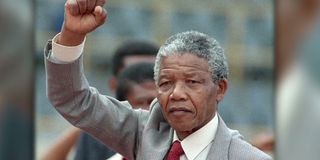Evaluating world leaders is tough

South Africa's liberation icon Nelson Mandela.
What you need to know:
The mouthpiece of the Communist Party of USSR was a newspaper called Pravda, which in Russian means “truth”, but it rarely published the truth.
During its heyday as one of only two superpowers in the world, the Union of Soviet Socialist Republics (USSR) was so powerful that whenever a senior official of the USSR sneezed at the Kremlin, the rest of the world would catch a cold, except the USA.
The mouthpiece of the Communist Party of USSR was a newspaper called Pravda, which in Russian means “truth”, but it rarely published the truth. Instead, it deliberately and systematically published propaganda on behalf the Communist Party. Pravda was founded in 1912 and one of its early editors Joseph Stalin who, many years later, came to personify the phrase, “enemy of the people”.
A front page story published by the New Vision of June 25 reminded me of Pravda. The headline of that issue of New Vision reads in bold capital letters: “Museveni named among best world leaders” which made a friend burst out in laughter.
My initial take on the story was that it was fake news, but to make assurances doubly sure I consulted a media expert on the matter. After a short while, he sent me a document, authored by two American economists, titled Shrinking dictators: How much economic growth can we attribute to national leaders? which appeared to be a scholarly piece of writing.
Under a column titled, “Significantly best leaders” Sabalwanyi is rated number 12 among world leaders and is followed by Singapore’s Cambridge-educated and outstanding former prime minister Lee Kuan Yew who lifted his country from third world to first world status in one generation. Uganda, on the contrary, is hoping against hope to achieve middle income status by 2020.
Prof William Easterly’s work contrasts sharply with a credible evaluation of African leaders contained in the 2012 Africa Leadership Index which I made reference to in my Sunday Monitor opinion of December 10, 2017.
The New Vision story brought to mind an article by Robert Guest published by The Economist magazine’s “The World in 2018.” Titled, “Should they stay or should they go?” the article begins by stating that by the end of 2018, Japan’s long-reigning Emperor Akihito will resign because “at 83, he has had enough” and proceeds to pose the following pertinent question.
“Why can’t more leaders be like Akihito? Knowing when to bow out gracefully is a virtue as essential as it is rare. George Washington had it. So did Nelson Mandela, Pope Benedict XVI and even, at the age of only 51, King Jigme Singye Wangchuck of Bhutan. Most leaders, however, think themselves indispensable long after the evidence suggests the opposite.”
Under a sub-heading, “I’ll be here till the end of time,” Guest writes: “Few rulers grow wiser in their second decade in office, let alone the third or fourth. Even if they start well, they eventually run out of ideas and come to believe their own propaganda. All power tends to corrupt, and a lifetime of it is irresistibly corrupting.”
“So it is disheartening to see rulers such as Paul Kagame of Rwanda and Yoweri Museveni of Uganda, who were once hailed as revolutionary reformers, try to glue their trousers to the throne.”
“The best antidotes to such folly are term limits for presidents and vigorously contested elections. Say what you like about Donald Trump, he won’t be in the White House for longer than eight years.”
Evaluating World leaders
The overarching quest to make citizens believe a leader’s deceptive propaganda was the primary role Pravda played effectively and zealously in the 20th Century for the top brass of the USSR, especially for the ruthless leaders of the powerful Communist Party.
So whatever the likes of New Vision are shamelessly trying to do in the 21st Century is nothing new. It’s an old and tasteless wine in a new plastic bottle!
In the final analysis the best evaluation of world leaders is made at national level by citizens. Where elections are genuinely free, fair and credible, an evaluation of the people will be reflected in the results of elections.
Where elections are not free, fair and credible, but routinely rigged, official results do not reflect the will of the people, as happens in most African countries, including some in our neck of the woods.
Hence, an accurate evaluation of national leaders is difficult, if not impossible to undertake by the key stakeholders, namely the citizens.
Mr Acemah filed this analysis for Daily Monitor from Kampala



